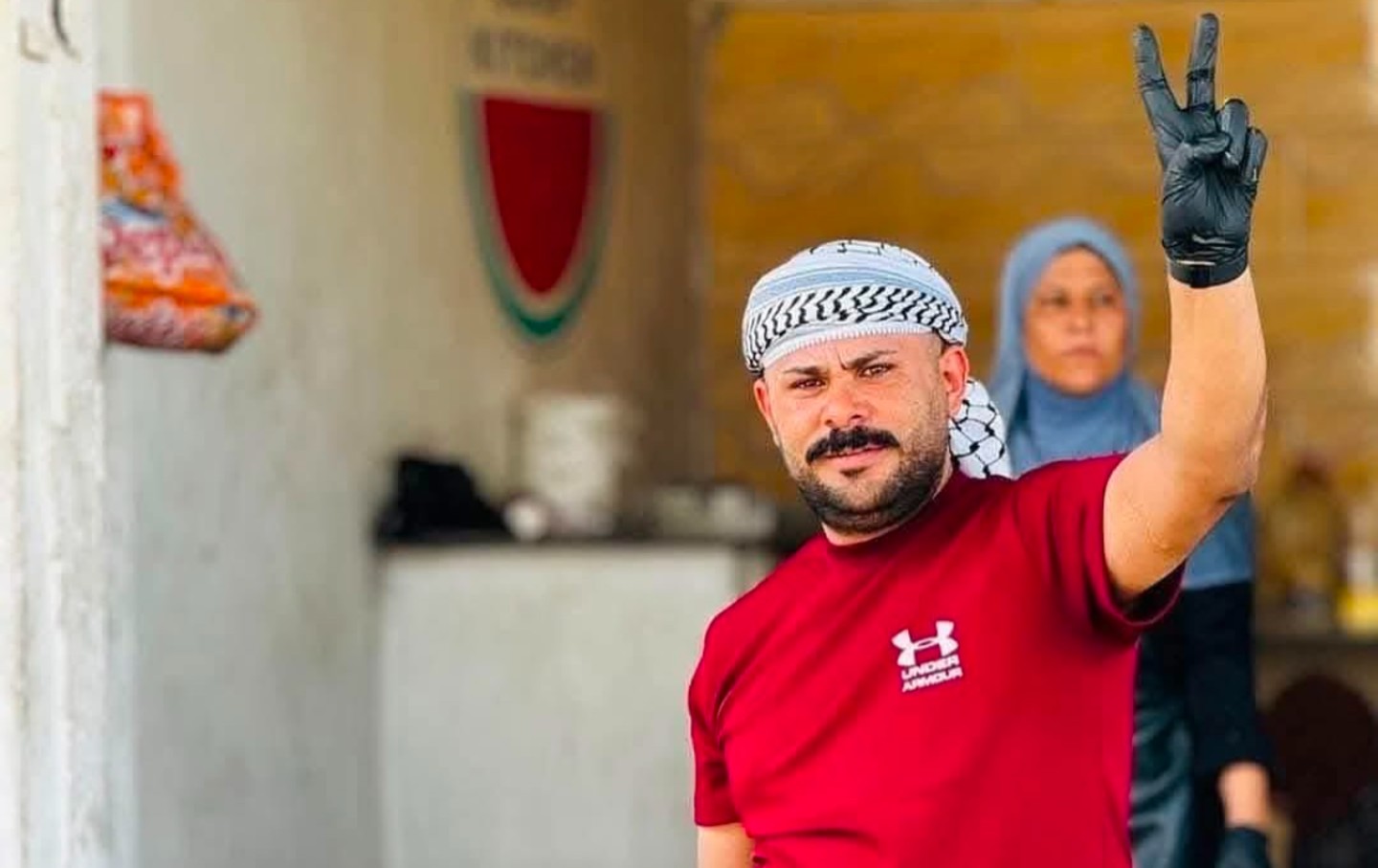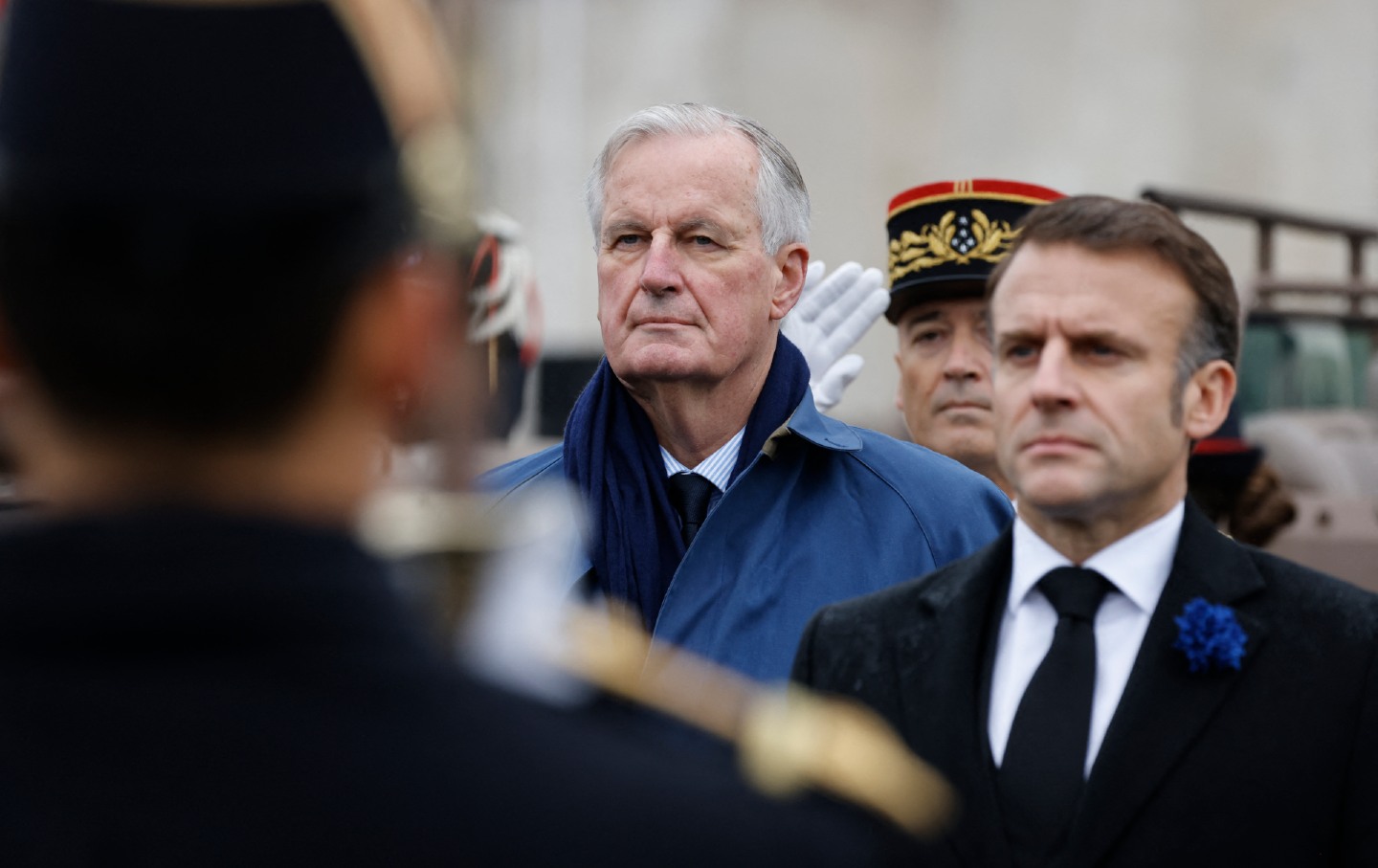/
December 12, 2024
Celebrations in Syria May Be Premature
The speed of the Assad dictatorship’s collapse stunned even the opposition. But the result is a power vacuum that Israel and Turkey have already moved to occupy.

There were no goodbyes in Damascus.
Only a day after a ceasefire between Israel and Hezbollah was achieved in Lebanon, a surprise offensive by Syrian opposition factions in the north, led by Hayat Tahrir ash-Sham, a Sunni Islamist militant organization, was launched. The aim of the offensive—the first in four years—at first was simply to deter the Syrian military from continuing its intensified shelling of opposition-held areas in western Aleppo province. But when government lines crumbled in response, villages began falling in droves to the opposition. The speed of the advances seemed to surprise everyone, even the opposition.
The city of Aleppo itself—fought over from 2012 to 2016 in grueling battles that left whole neighborhoods reduced to rubble—fell this time after only a couple of days. Armed groups pushed south. Turkish-backed groups long dormant in their fight against Assad reactivated. Rebels in the south, once reconciled with the state, abandoned their agreements and drove toward the capital. One organization, the Syrian Free Army, whose leadership is controlled by the United States, even pushed into the city of Palmyra, deep in the country’s desert interior.
Attempts by the government to build defensive lines in Hama failed. Videos of southern cities like Dara’a being under opposition control were denounced as fakery. Recordings of opposition victories were derided as AI fabrications. Surely there would be a final stand—if not in Homs, then perhaps in the west, maybe in Damascus—to finally break this sudden deluge fast approaching. And then, like all the gas burning in a beaker, the flames suddenly vanished.
Thousands upon thousands had died in a war to preserve the Syrian government led by Bashar al-Assad. The Syrian Arab Army, alongside both militias from home and allies such as Hezbollah and the National Defense Forces, aided by experienced Iranian commanders and soldiers, fought this war in the belief that this ostensible battle to maintain the stability of the Ba’athist state, to guard religious pluralism, to beat back Islamism, to protect Shia shrines from destruction, to save the supply lines to Palestine, could not be lost. The stakes were too great, the matters too precious. Yet, in the end, Assad fled for Moscow without saying a word. His prime minister was left behind to cede power to those very Islamists.
In the past, the measure of startling opposition offensives was the fall of singular neighborhoods in sudden blows, or sieges broken only thanks to the massive combined efforts of a plethora of different groups. The Syrian government had withstood internal conflict for over 13 years. Yet, in a little over a week, the entire state collapsed.
Current Issue
Preparations to confront Assad’s government again in a major fashion had likely been ongoing for months, but launching such an offensive while Hezbollah was directly fighting with Israel could have been too much of a potential embarrassment for HTS, whose fighters and allies would be remiss to not mention their desire to one day march on Jerusalem. Once the fighting stopped in Lebanon, however, the window for HTS and others to act had opened.
The survival of the Ba’athists in the 2010s was to a major degree itself due to foreign intervention, first by Hezbollah and then Russia. But with Putin now preoccupied by the war in Ukraine, Russia’s focus was no longer on protecting its Syrian assets with fervor. Foreign Minister Lavrov, when asked about these developments at a conference in Doha, responded with exasperation, accusing the moderator of trying to “drown [him] in Syria.” Hezbollah, having exited just a few hours previously the main stage of its largest war with Israel to date, had no political capital to expend on another major front in Syria. As of this writing, the group’s leader, Naim Qassem, has yet to even address events in Syria. Though left exposed, Assad’s administration refused to see the crisis rapidly developing.
Syria’s long civil war never ended, only receding into the background. But the past four-year ceasefire in Idlib—the main hotbed of opposition control—had led to an atmosphere of complacency. Army defenses were dismantled. Soldiers on both side of the front lines were sent elsewhere. Rampant corruption inside the Syrian military continued to spread, while jihadists increased in their restlessness. Perhaps Assad assumed that his rapprochement with past foes like the United Arab Emirates and Saudi Arabia—who had once funded Salafist foes against him,—would be the assurance of his continued governance, even as a brittle national economy continued to falter under the weight of crippling American sanctions. In recent years, Assad has seemed to rely less and less on the intel and desires of the Axis of Resistance: expelling the representatives of the Houthi movement, rejecting its requests to open a front against the Israeli occupation of the Golan Heights, and dismissing Iranian warnings only this past month about the potential for the state’s collapse.
When those warnings came to pass, there was no preparation, no plan, no hope. Iran’s foreign minister put it bluntly: “The main element that led to the success of the latest developments in Syria was only that the Syrian army refrained from putting up any resistance.… If it had done its job, Aleppo would not have fallen. I say this with full confidence.”
Meanwhile, HTS—once the Al Qaeda affiliate in Syria known as Jabhat an-Nusra—consolidated its hold on power, placing Idlib under the control of a parallel Sunni Islamist regime known as the Syrian Salvation Government. That government now sits in the halls of Damascus.
Assad evidently assumed that infighting among the countless opposition groups would prevent them from ever marching on the capital again. But the Syrian army’s defenses crumbled so fast that renewed infighting never had time to develop. Now, however, after the government has fallen, those conflicts may emerge on a nationwide scale, not confined to Idlib or northern Latakia or Aleppo. The Baathists have handed power to the Salvation Government, but that is not the only parallel Syrian government that exists.
The Southern Front, bringing together tens of various somewhat more secular rebel groups, allied itself with HTS to take Damascus, but draws its support from different sectors of Syrian society that may prefer more democratic institutions. Turkey has set up the Syrian Interim Government in areas of its control in northern Syria, run by armed groups currently fighting against the US-backed Kurdish militants of the YPG and its allies. When those guns fall silent, they may turn them once again against HTS, just as they did only a few short years ago. In the past, HTS also competed with other Islamists for power, and the groups that helped assure its current victory—like Ajnad al-Kavkaz and the Turkestan Islamic Party—have goals outside Syria that the new government may not be keen on pursuing, goals inside Russia and China. Publicized general amnesties for Syrian soldiers issued by the HTS leadership coexist with videos of violent and public executions. Those who were restless in Idlib before may become restless once again.
Meanwhile, another dark cloud is gathering. Israel has publicly responded to the sudden fall of Assad with a contradictory mix of celebration and military invasion. In reality, Israel sees, and is taking, an opportunity to seize more Syrian land. Israeli troops have moved quickly into the UN buffer zone in the Golan Heights, claiming to want to protect settlers from instability in Syria. Hundreds of air strikes have rocked Syrian military sites, destroying most of the major capabilities of the new Syrian state to protect itself. Already, far-right figures close to Prime Minister Binyamin Netanyahu are speaking of the need to settle in this new territory, to never leave, and to assert Israeli sovereignty. Netanyahu himself, when speaking in English, emphasized that this would be a “temporary defense position.” When speaking in Hebrew, to an Israeli audience, he gave no such assurances.
Popular
“swipe left below to view more authors”Swipe →
-
Luigi Mangione Is America Whether We Like It or Not
Luigi Mangione Is America Whether We Like It or Not
-
Celebrations in Syria May Be Premature
Celebrations in Syria May Be Premature
-
Why Bidenomics Was Such a Bust
Why Bidenomics Was Such a Bust
-
The Fall of Syria Changes Everything
The Fall of Syria Changes Everything
Despite such a massive provocation, the new Syrian government has not directly acknowledged any aspect of Israel’s military assault. Other states have condemned it, and yet neither HTS leader Abu Muhammad al-Jolani, Prime Minister Muhammad al-Bashir, nor any public-facing official has even mentioned the fact that the IDF is invading its sovereign territory and bombarding Syrian cities, with foreign journalists seeming incredulous that its representatives have to be pressed in order to mention it. Perhaps HTS does not want to engage in a military conflict with Israel so quickly after achieving victory. Perhaps it hopes that Israel will be satiated once it finishes destroying the remnants of Syria’s military capabilities. Perhaps it does not want to bite the hand of the country whose war against Hezbollah undoubtedly paved the way for its march into the presidential palace. Perhaps it hopes that a country that once pragmatically supported the opposition in the south could pragmatically support it again. Regardless, once the euphoria wears off, and the joy of achieving power wanes, the Salvation Government may learn that the fires Israel starts are not put out easily.
Séamus Malekafzali
Séamus Malekafzali is a journalist and writer primarily focusing on the politics of the Middle East.
More from The Nation
The Fall of Syria Changes Everything
The Fall of Syria Changes Everything
Retired diplomat Chas Freeman and writer Pascal Lottaz discuss what happens now that Damascus is in the hands of Hayat Tahrir al-Sham.
Netanyahu Must Be Brought to Justice. But We Can’t Stop There.
Netanyahu Must Be Brought to Justice. But We Can’t Stop There.
This genocide is a massive criminal undertaking, and we must hold as many of its perpetrators accountable as we can.
Dyab Abou Jahjah for the Hind Rajab Foundation
My Brother Chef Mahmoud Almadhoun Died Because He Fed Gaza’s Starving Citizens
My Brother Chef Mahmoud Almadhoun Died Because He Fed Gaza’s Starving Citizens
His killing by Israel sent a chilling message that no one is safe, including humanitarians who stand in the way of Gaza’s erasure.
The Underground Network Helping Gazan Refugees Survive in Egypt
The Underground Network Helping Gazan Refugees Survive in Egypt
A patchwork of volunteer-run mutual aid organizations has sprung up to tackle the severe problems facing people fleeing genocide.
The Dangers of Trump’s Foreign Policy
The Dangers of Trump’s Foreign Policy
Strategic incoherence and factionalism reign.
Macronism Has Died a Second Death
Macronism Has Died a Second Death
The French parliament votes to oust the government.






